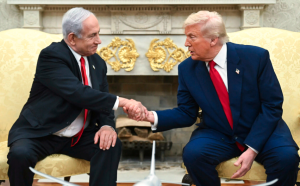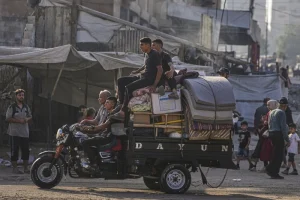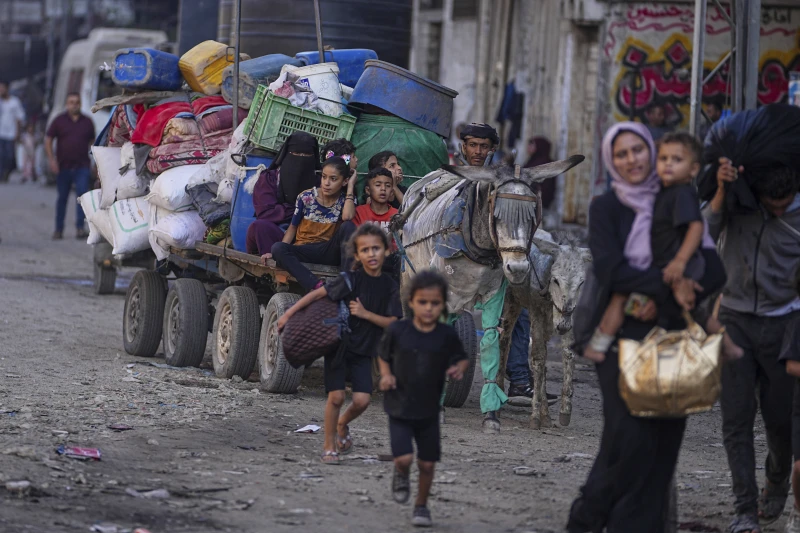US President Donald Trump has urged progress in ceasefire talks in the 20-month genocide in Gaza on Sunday.
This push for a ceasefire deal from one of the world’s most powerful (and unpredictable) man comes amid Israel’s recent order to Palestinians to evacuate from parts of northern Gaza ahead of increased military action. The Israeli military plans to expand west-ward, and Palestinians are expected to find safety from a pile of rubble to another.
The number of victims in Gaza, meanwhile, is in double digits everyday.
“MAKE THE DEAL IN GAZA. GET THE HOSTAGES BACK!!!” Trump wrote on social media early Sunday. Though Palestinians remain sceptical, Trump raised expectations Friday by saying there could be an agreement within the next week, according to news agencies.

The last ceasefire was eight weeks long. Israel brutally ended it in March. It has killed around 6000 Palestinians—mostly women and children—since then.
Israel also imposed a total blockade on humanitarian aid deliveries to Gaza at the start of March, which it partially eased after 11 weeks following pressure from US allies and warnings from global experts that half a million people were facing starvation.
Israeli attacks continued. An airstrike on Sunday evening hit a house sheltering displaced people in the Jabaliya al-Nazla area, killing at least 15, according to Fares Awad, head of the Gaza’s Health Ministry’s ambulance and emergency services in the territory’s north.
Israel’s military did not comment on the strike, but the area—Al-Mawasi near the coast—fell under the latest evacuation order.
The victims on Sunday also included at least five Palestinian aid seekers killed near food distribution centres run by the controversial Gaza Humanitarian Foundation (GHF) north of Rafah, says Al Jazeera. Since the United States- and Israel-backed GHF took over limited aid deliveries in Gaza in late May, Israeli soldiers have regularly shot at Palestinians near distribution centres, killing more than 580 people, and wounding more than 4,000, according to the Gaza Government Media Office.
The Israel Defence Forces (IDF) spokesman Avichay Adraee said on Sunday that the Israeli military was operating in north Gaza “to eliminate terrorists and terrorist infrastructure”.
A recent report by Israel’s Haaretz newspaper quoted unnamed Israeli soldiers as saying they had received orders to fire at crowds of unarmed aid seekers to disperse them. Israeli Prime Minister Benjamin Netanyahu and Defence Minister Israel Katz has denied the claims. They called the report’s findings “malicious falsehoods designed to defame” the military.
As the “war” in Gaza wages on and protestors around the world remain undeterred in their support despite police crackdown (the students of Columbia University can attest), the promises of relief remain elusive.
Egypt’s Foreign Minister Badr Abdelatty said that his country is working on a new Gaza deal that includes a 60-day ceasefire in exchange for the

release of some Israeli hostages and the rapid entry of humanitarian aid into the besieged enclave on Sunday.
He the proposal is a joint effort by Egypt, Qatar and the US and represents “a first step” toward a sustainable ceasefire, reports Anadolu. This move, the top diplomat said, “would create momentum to move toward a lasting ceasefire, eventually leading to the implementation of the January 19 agreement.”
However, merely holding “talks” for a ceasefire itself has been a long-time coming. The death toll has reached 56,500 this week starting from October 2023. The war has displaced most of Gaza’s population, often multiple times, obliterated much of the urban landscape and left people overwhelmingly reliant on outside aid. Fewer than half of Gaza’s hospitals are even partly functional, and more than 4,000 children need medical evacuation abroad, a new UN humanitarian assessment says.
Trump also doubled down on his criticism of the legal proceedings against Netanyahu, who is on trial for alleged corruption, saying the trial interfered with ceasefire talks. Last week, Trump called for the trial to be canceled. It was a dramatic interference in the domestic affairs of a sovereign state. It unnerved many in Israel, despite Trump’s popularity there.
As the IDF moves into northern Gaza again and innocent civilians are forced to flee once more, the question of what happens next to the Gazans is left behind in the dust, unanswered.


